Peter MALONE
Inauguration of Ametur website of the MSC General Administration
Inauguration of Ametur website of the MSC General Administration www.ametur-msc.org

On October 21st, the anniversary of the death of Jules Chevalier, MSC Communications launched the new Ametur website.

The Ametur Facebook page has been available for some time.

We asked one of our site photographers, Trieu Nguyen, studying at Cuskelly House in Blackburn, for a screen shot of the Home page.

Within minutes, he sent six! Here they are to welcome the site, inviting everyone to visit and to bookmark.


Worth

WORTH
US, 2020, 118 minutes, Colour.
Michael Keaton, Amy Ryan, Stanley Tucci, Tate Donovan, Shunori Ramanathan, Talia balsam, Laura Benanti, Chris Tardio, Ato Blankson- Wood.
Directed by Sarah Colangelo.
Worth is a good word, a solid word. It takes us into the realm of values. In fact, the original title for this film is What Is Life Worth. In fact, as we watch the film and its exploration of characters, we are continually being asked “What is a life worth?”. And how is this question to be answered? In monetary terms, a financial figure? Or beyond that?
The question was asked in the United States after 9/11 and this film is receiving its release, at the Sundance Film Festival and, then, on Netflix, on the 20th anniversary of those planes crashing into the World Trade Centre and the Pentagon. At the time, the world was preoccupied with the immediate loss of life, the consequences, grief, amazement, continuing health problems, as well as the broader aspects of what became the war on terror and the invasion of Afghanistan (sadly and ironically coming to a close on the 20th anniversary).
But, there were financial questions asked, issues of insurance, the air companies lobby, compensation by the American government, issues in Congress. With Worth, we are taken into this particular aspect of 9/11, a process from 2001 to 2003, the 9/11 Victim Compensation Fund, with prominent legal mediator, Kenneth Feinberg, accepting the role.
Soon into watching the film, it seemed a good idea to go to Wikipedia and find out something about Kenneth Feinberg, his background, his legal history, his role with the Compensation Fund, as principles. This exercise was enabling, for watching the film and appreciating what Feinberg hoped for, what he did, the challenges, his achievement (and, rather jaw-dropping, the final credits listing of situations in American history in the last 20 years, disasters, compensations, Catholic Church abuse cases… That he and his colleague, Camille Biros have been asked to mediate).
Michael Keaton, a wonderful comedian in the past, has been taking on more and more serious roles, men of integrity. Amy Ryan gives solid support as Camille. And a range of character actors takes on supporting roles convincingly. But, as the film progresses, there are numerous interview sequences, survivors telling their stories, some angry, some still grieving, some bewildered. These are so convincing – and, one hopes, that the short segments serve as audition material for future roles by these character actors.
The other chief character in the film is Charles Wolf, played by Stanley Tucci, an actual character, who lost his wife in the World Trade Centre collapse. Wolf was highly critical of Feinberg’s model for the fund, starting a counter-movement “Fix the Fund”, offering advice, offering a different perspective on contact with survivors and their relatives, meeting with Feinberg and his associates, influencing Feinberg and his approach, ultimately with the declaration, “The Fund is Fixed”, finally ensuring that the Victim Compensation Fund requirements for registration were filled in time for the project to go into action.
For those of a Jungian frame of mind, this is a powerfully dramatised presentation of objective structures for funding compensation relying on the letter of the law, accuracy and precision, setting limits, eschewing exceptions. Charles Wolf’s approach and, was highly personal, much more subjective in respect of and respect for those who grieved and suffered, listening to stories, realising that categories could be constricting and that there were interpretations to be made. Two particular stories come to the fore to illustrate this, a fireman killed and his loyal wife’s discovery that he had another family who are in financial need, a gay man who lost his partner (whose parents deny his sexual orientation),
It is rather saddening to read some bloggers dismissing the film as boring. Others declared that they were engrossed, moved, sharing an experience of realising what a life is worth. Yes.
- The title? What is life worth? What is a life worth? In general, in the context of 9/11? The Victim Compensation Fund?
- The period, 9/11, the impact, the event, tragedy, personal grief, issues of compensation?
- Washington, legal offices, the compensation fund offices, Ken Feinberg and his home, the travelling by train? The feel of the period? The musical score?
- The character of Kenneth Feinberg, legal experience, his age, public service-minded, his work with Camille over the years? His home life, with his wife, her support, a sounding board? The issue of the fund, the discussions with the attorney general, his accepting the task, his motivations? Camille and her agreeing? His lectures, students, the choice of Pryia and Daryl for the staff?
- The setting up of the office, the discussions with the attorney general, the implications for legislation, for Congress, compensation, justice, issues of suing, the airline lobby? The role of Lee Quinn? The face of legislation, the face of deals? The many interactions between Ken and Lee? Differences, hostilities? The issue of coaching witnesses for interviews?
- The setting up of the parameters for the fund, legal, letter of the law, no exceptions? The deadlines, the number of submissions required? 80%? The meetings, Ken and his manner of addressing the crowd, the hostility, questions, anger? In felicitous phrasing? Advice from Camille?
- Charles Wolf, his background, local concerns, his explaining the history of campaigning for the retaining of the bridge, two years, his failure, his wife reminding him that he was not the bridge itself, he was still there? Her death? His different perceptions for the fund, his slogan that the Fund was a Fix? His meetings, drawing the relatives of the survivors? His going to see Ken Feinberg, courteous, the meeting, coming people down, yet the different perspective? The comment on the typos, criticism of the whole fund framework?
- The effect of the interviews? The range of characters for the film? Only some minutes of performance yet their creating instant, strong characters, grief, reactions to 911? Each of the interviewers? Ken not interviewing, starting to listen in, his being challenged? Staying back over time to listen to Mrs Donato, previously meeting her brother-in-law? The film’s focus on Karen Donato, her devotion to her husband, her image of him, not wanting the money? Frank and his meetings with Ken? The later revelation about her husband’s double life, alternate family, Ken and his confrontation with Frank, Karen overhearing, her reaction, later coming to see him, wanting the other family to have some compensation? The gay man, the discussions, legislation about partnerships, going to see the partner’s parents, their denial?
- The discussions with Charles Wolf, Priya going to see him, the discussions? His visit to Ken, an alternate approach to dealing with people? The shift from the objective and deviations to more subjective, personalised, exceptions? A new framework?
- The change of heart, people becoming more confident, telling their stories, the deadlines coming, the percentages going up?
- The discussion with Charles Wolf, his accepting the changes, that the Fund was Fixed? His urging his followers to go to Ken?
- The deadlines, Lee Quinn and the compensation cases? The discussions with the attorney general? Congress issues?
- The final rush, getting up to 95% at the time of the deadline?
- The achievement for such a compensation fund with such a national tragedy? In the final information about can Feinberg, Camille, the vast number of cases they have taken up and mediated?
9/11: The Falling Man
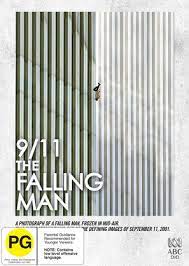
9/11: THE FALLING MAN
UK, 2006, 80 minutes, Colour.
Narrated by Steven Mackintosh.
Directed by Henry Singer.
This is a British documentary, not an American documentary. While it has graphic sequences throughout, it brings the 9/11 American experience vividly to the screen. It is narrated in a quietly measured way by actor, Steven Mackintosh. The director, Henry Singer, was to go on to make quite a number of strong documentaries.
The film was released five years after the events, enabling audiences around the world to go back to the images, the experiences, the shock, the grief, bewilderment. And, seen in succeeding decades, it still holds audience attention.
The film draws on familiar footage of the impact of the plane crash on the North Tower, the direct filming of the second crash into the South Tower. And there is the footage of the collapse of both buildings. There are scenes of bewilderment of observers on the ground. Scenes of firefighters and rescue is going to their work. There is also the personal effect with interviews with a number of survivors, especially the chef at the renowned restaurant at the top of the North Tower, Window to the World. And there are survivors who relate the stories of their phone calls and texting to spouses and partners trapped in the upper stories of the towers. These will always make an impact because of the personal involvement.
(The film, Worth, of 2020, offers background to the tragedy, to the survivors, to their relations, in terms of the Victim Compensation Fund, the focus on its administration by Kenneth Feinberg over two years, the critique by Charles Wolf about the approach of the fund, the transition from the application of regulations and conditions to the listening to the stories.)
However, as the title indicates, there is a focus on the photo of The Falling Man, one of the many who fell from the upper stories of the towers. Photographer Richard Drew captured the moments of one particular man falling. It was reproduced in the media, the film shows the Allentown, Pennsylvania, staff and their deliberations as to whether to publish or not – and the angry reaction of the public to the publication, to the effect on the public as they looked at the photo and, for a while, the photo disappeared.
Crucial to the film is the work of a journalist who investigated who the falling man might be, coming to the conclusion that it was one of the cooks in the restaurant, contacting his family who reacted very badly, a Hispanic Catholic family who felt that identifying him and suggesting he jumped made him a suicide and, according to their beliefs, gone to hell.
Another investigator was motivated to check on the identity of the Falling Man, enlisting the aid of a private detective, looking at the photos of those who had disappeared, on the walls around the World Trade Centre site, selecting those who physically resembled the photo of the falling man.
To this extent, the film is an investigation, suggesting possibilities, eliminating candidates, attempting to interview relatives and friends, including the chief chef of Window to the World, who ultimately does agree and there seems to be some consensus that this man might have been a cinematographer working on the floor, Jonathan Briley. The film gives a sympathetic portrait of the man, interviews his family.
While there can be no certainty, one of the conclusions drawn is that significant events need some kind of symbolic Memorial, like that to the unknown soldier, all the photos that made their mark from the Vietnam war, the officer shooting the Vietcong soldier, the little naked girl running along the street. And so, Richard Drew’s photo of The Falling Man becomes this kind of significant, timeless Memorial, of a man and his dignity, who had the option of burning death or falling to the ground.
It is one of the many films about 9/11 but, within its brief running time, is significant.
The issues featured in Spike Lee’s NYC Epicentre TV series.
Smaller and Smaller Circles
SMALLER AND SMALLER CIRCLES
Philippines, 2018, 111 minutes, Colour.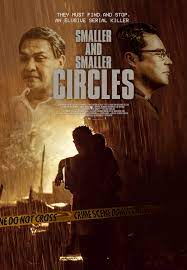
Nonie Buencamino, Sid Lucero, Carla Humphreys, Jun-jun Quintana, Gladys Reyes, or Ricky Davaol, Bembol Rocco, Christopher De Leon.
Directed by Raya Martin.
Smaller and Smaller Circles is based on a novel by Maria Felisa H. Bacatan, very successful when released in the early 2000’s. It is a sophisticated Filipino film in its writing, direction, performances.
At the core is a series of murders, the emergence of a serial killer despite statements that there are no serial killers in the Philippines. The victims are young boys at the beginning of puberty, stabbed, the bodies disposed of in the dump, genitals and faces mutilated.
While there are police investigations, they are hampered by some personal ambitions as well as some inept work. At the centre of the investigations here are two Jesuits, Fr. Gus Saenz (Nonie Buencamino, from Filipino actor and completely convincing here) and Fr. Jerome Lucero (actor and sometime heartthrob, Sid Lucero). (If Fr. Brown can be a detective why not Filipino Jesuits!).
The film shows great respect for the Jesuits, authentic feel, with many Jesuits consulting for the film, showing the traditions, St Ignatius Loyola, strong education background. Fr. Gus has set up a laboratory with state funding – which comes under threat from the official church, a long-time clash with the Cardinal about the moving of a priest and his dubious financial dealings from parish to parish and threatened by the wealthy Conservative woman president of the charity foundation. In fact, the Cardinal is presented as particularly smarmy, arrogant manner, for the law of the church, for every case to be considered with Canon Law rather than going to the police (the setting is 1997 which now seems attitudes of the past). In the background there is another story of sexual abuse of minors – and while at the centre of this murder mystery is sexual abuse, it is by a physical education teacher in a school.
The screenplay works well in showing the Jesuits at work, the collaboration between the two men, older and younger, insights, following leads, identifying the bodies and having to deal with grieving parents and grandparents, victims of urban poverty. They build up their information, follow a good lead in checking dental records, narrowing the investigation and rejecting the claims of a man who confessed and who becomes the occasion for police self promotion.
Ultimately, the circles become smaller, the murderer is identified and pursued, a scene of pastoral care by Gus as he talks with the dying murderer, discussions about forgiveness and God, and a sudden stabbing attack by the murderer.
Worth seeing as murder mystery and investigation. Worth seeing as presenting images of the Catholic Church in the Philippines.
- Murder mystery, a police investigation, the priests’ investigation? The title and the narrowing to the finding of the perpetrator?
- The Philippines setting, a Philippines story and characters, the city, the city waste dump, the narrow streets, the mobile dentist, the contrast between the classes in the Philippines, the poor and their struggles, the rich, politicians, police, charities, the Church? The Jesuit, offices, morgue, the churches, the charities for food? Authentic atmosphere? Musical score?
- The prologue, the finding of the body in the dump, the reaction of people? The mutilated body? The voice-over, the stream of consciousness of the murderer, continuing throughout the film, commentary, as a child, not liked, school, at the back, making friends, the sexual abuse and his response, growing up, his angers, venting his angers, cruelty, the de-personalising of his victims, the mutilations, genitals, face?
- The focus on the Jesuit’s, the Philippines has a Catholic country, respect for the priesthood, for ‘the Jesuits? The introduction to Gus and Jerome? Age difference, working in community? The office? Jesuit background, St Ignatius’ picture…? The ethos of the Jesuits in the church, education, ministries? Jerome and his background, flying to Boston, his education? Gus, a teacher, long experience, setting up the laboratories, government grants? Their involvement in the investigation?
- The police, the chief, going on television, with the Cardinal, his collapse, hospitalisation, his successors taking over, their wanting publicity, decisions about finding a perpetrator, finding the man who confessed, not examining the evidence and its consistency, the press conference? The recovery of the chief, his calling in the police, the dismissal of his successor? Getting his officer to continue but with collaboration with the Jesuits?
- The Jesuits, Jerome in Boston, the texting, his return, the examination of the bodies, the morgue experience, the close-ups of the mutilations? Speculation? The identification of the bodies, the boy and his shirt, the grief of his parents, their poverty, going to the food bank and the dump? The grandmother and her gift of bananas? Questions about a sadist God?
- The visit to the food bank, charity, volunteers, the nuns? Fr. Edgar, running the work, the discussions in the church? Information about the personnel?
- Jerome, the investigation of the dates of the killings, the calendar, the first Saturday of the month? The catering coming to the charity centre? The visit to the local councillor, the information about the caterers? The visits, interviews with the manager, her son, getting information about the man who confessed?
- Carding, his confession, the details, but not fully accurate, especially concerning the knife?
- Joanna, French background, in the Philippines, her investigations, camerawork and interrogations, her surveillance set up, the records? The discussions with Gus, past friendship? Meeting Jerome? The next dead body, filming in the dump, the evidence, the video for the Jesuits? Her eventually going to Mass, the discussions with Gus after mass, wanting him to help her with some work, having breakfast as the ending?
- The official church, the Cardinal, his pomposity, smug appearance, moving the Monsignor from parish to parish despite the accusations about his money dealings, on the television, the cover, the collapse of the police chief, the meeting with the Jesuits, the antagonism? At the social, the rich woman president of the charity, cutting off the Jesuit funds, her presumption about everybody being loyal to the priests and the church?
- The background of sexual abuse cases, the setting of 1997, everything within the church, within Canon Law? Joanna and her reports of the abusive priest and her pursuing him?
- The background of sexual abuse, the physical education teacher, his selection of the boys, his behaviour, abuse and the consequences? Cuts and his visit to the parents of the murderer, the discussions with his schoolfriend companion and the description of what happened?
- The travelling mobile service, the dentists, Gus and his reluctance, eventually going, finding the implement and suggesting it was used for the removal of the victims’ faces? The decision to check the teeth of the victims and the records? The tedious work, some identification?
- Alex, his files, not being incorporated? More information about him, the days and dates of his work, the assistant and his helping, his absence and Alex taking his place?
- The narrowing of suspicions to Alex, his following the boy, the attempted assault, his being bashed? His taking refuge, mutilating himself? The police surrounding the building, Gus deciding to go in, the compassionate listening, talking, God’s forgiveness? The shock when Alex stabbed Gus?
- Gus, recovery, Jerome? The collaboration with the police and solving the case?
- The ending, the focus on Gus, celebrating Mass? And his continuing his work, to help Joanna?
Obscure Life of the Grand Duke of Corsica, The
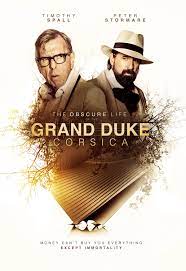
UK, 2021, 93 minutes, Colour.
Timothy Spall, Peter Stormare, Matt Hookings, Alicia Agneson, Noeleen Comiskey, Lucy Martin, James Mackie.
Directed by Daniel Graham.
For the 2021 distribution of this film, the word “obscure” was dropped from the title. But, “obscure” is certainly relevant. Perhaps a warning for those who do not like obscurity. Perhaps an invitation to those who enjoy it.
The film was written and directed by Australian director, Daniel Graham, his early career involved film distribution and links with a whole range of European and international directors. And this serves as a background for this sometimes obscure film, located in Malta and photographed there, set in 2021, life going on as normal (with quite some introductions to not so normal life), but with an increasing presence of mosquitoes and, by the end, something of a malaria pandemic.
However, the film does open in 1221. It is the period of St Francis of Assisi, the saint with his friends discussing something about life, the unity of creation – with some touches about the earthiness of human existence. Later, it would emerge that this is a film about St Francis, his love of poverty, his quest for holiness, his love for creation and the song of the birds, but his deep desire for humility and compassion, to meet a leper and to kiss the leper. And this does happen in the film, a sick woman, astounded by the experience and the saint literally unmasking her to see her real self (and the pathos of her return home to her loving mother who is initially overjoyed but then suspect that this is the work of the devil and her daughter is contaminated and to be rejected).
At one stage, the central character of this film, a blunt and obnoxious world renowned architect, Alfred Rott, played in his usual arresting, though this time alienating, manner by Timothy Spall, goes to see the film of St Francis. He is in Malta, in consultation with local councils, offering designs (criticised for their explicit sexual content), invited to a weird party (echoes of Eyes Wide Shut), summoned to the house of a billionaire, the Grand Duke of Corsica. The Duke is played by versatile character actor of more than 100 films, Peter Stormare. The Duke has ambitions, wants to employee Alfred Rott, but with his illness and impending death, he settles for the building of a mausoleum.
Alfred Rott becomes friendly with the Duke and, ultimately, completes quite an esoteric mausoleum, where the decaying body material can descend into a canal leading to a tree, peach tree, so that it can recycle life. And, there is an epitaph on the mausoleum from St Francis, about the unity of everything but in different forms.
What is happening is that mosquitoes are increasing in numbers on the island, biting people, creating a malaria plague. At the end, inhabitants are warned to escape from the island by any means possible. Which is where we see the last of Alfred Rott.
This has been a strange encounter, to say the least, touches of weirdness and the bizarre, but tantalisingly arresting our attention.
- The impact of the title? The revelation of the Grand Duke, phony, billionaire, his life, obscurity, illness and death, fame in death?
- The Malta settings, the countryside, islands and sea, stately homes, official offices and paintings, the art tradition, social functions, hotels? The musical score?
- The prologue, the film about Saint Francis, the Friars, the discussions, philosophical implications about the unity of creation, same substance, different forms? The touch of earthiness and faeces? The continued introduction of the Saint Francis film, Alfred Rott going to see it and being impressed by it? The actor, his personal life, liaison with the director, malaria, his illness, suffering, the film on the television screen in his room, his death? His ideas about the song of the birds? The importance of the sequence of Saint Francis and his wanting to kiss the leper, his motivations, charity, humility, encountering a woman, her drinking, the pool, the encounter, the talk, Francis kissing her, the effect, the leprous mask coming off, Francis seeing her real self? And the irony of her going back to her mother, her mother’s delight, then fear, superstitions taking over, that her daughter was in league with the devil? The daughter going off by herself, rejected?
- 2021, the story of Alfred Rott, his fame as an architect, buildings around the world from Leipzig to the US, his initial visit, the consultation in the vast Hall, alleging sexual images, his offhand manner, alternate interpretation? His abrupt manner, obnoxious behaviour? At the hotel, the invitation to the party (echoes of Eyes Wide Shut), meeting Poppaea, the attempted seduction, his having conversation instead, the people of the party, behaviour, masks, sexual behaviour, corruption?
- His going to see the Grand Duke? The Duke, his manner, wealth, home, the attendance, Jerome and his being present, advice, later rejected? The Duke enjoying his conversation with Alfred? Alfred intrigued by the Duke, going against his normal practice, having meals with the Duke, the discussions about architecture, the designs, the plans? The continued discussions, the narrowing down the plan to a mausoleum? The initial designs, Alfred’s reaction, his final proposal?
- The Duke, the malaria, his continued illness, wanting his last tailored suit, allowing the doctor to visit? Alfred and blindfolding the Duke, leading him to the mausoleum, the description of the mausoleum and how it was built, the sarcophagus, the draining of the body, the fertilising of the tree? The Duke pleased? The return home, testing the coffin? His illness, lying on the bed, indicating the money for Alfred, his dying?
- The malaria, on Malta, the mosquitoes and their prevalence, people being sick? The actor?
- Alfred, his sexual behaviour, the liaison with Lucy? And the upset of her vomiting?
- The aftermath of the death of the grand Duke, the news about the pandemic, urging everybody to leave Malta by any means, the crowds, the gas masks and refusal?
- The body in the small boat, the uniformed man coming down, throwing the body overboard, sailing away – and unmasking? Alfred Rott?
- The overall impact of the film? Architecture and the arts? Personal eccentrics? Moral and amoral behaviour? The introduction of St Francis and his life? In the final epitaph on the Grand Duke’s term about unity and diversity of forms?
Last Bus, The
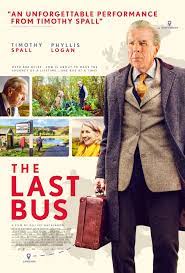
THE LAST BUS
UK, 2021, 86 minutes, Colour.
Timothy Spall, Phyllis Logan, Natalie Mitson, Ben Ewing.
Directed by Gillies MacKinnon.
Perhaps the older you are, perhaps the more you will enjoy this film. At the centre is Timothy Spall as Tom Harper, old man, 90ish. We see him in his home at John O’Groats and his decision to go to the other extreme of Britain, to Land’s End where, we eventually learn, he originally came from with his young wife, Mary. He now wants to journey back, studies the map, traces his route, has his ticket, has his folder and notebook with details of the buses, the routes, B&B stopovers. He is prepared but he is old, physically unwell, but determined.
Most audiences have identified with Tom and his journey, with his genial personality and the way that people respond to him during his journey – not only in personal encounters, but with everybody having a camera, instagram photos, selfies, sharing them all on social media which, of course, he does not realise.
Some responses have said that the story is boring, just following an old man on many, many buses. Others, this reviewer included, identify well with Tom, want to be with him on his journey, want to know what the purposes of the journey are, how he will manage, how we will succeed, and what is the goal.
The audience does spend a lot of time inside buses, sitting with Tom, observing him, looking out the window at the range of Scottish and British countrysides, small towns, cities, the sea.
Timothy Spall is in every sequence and is so persuasive, elderly, a bit lined, jutting bottom lip making him look forbidding, teeth, a certain severity – but able to move into the most genial and friendly of smiles.
The plot, in fact, is made up of a whole range of vignettes, some very brief in running time but effective, many of the memorable. On the whole, people are very warm in their response to Tom (becoming a touch more hostile the further south he goes). There are, eventually, pompous bureaucratic British bus drivers who won’t acknowledge his ticket, counterbalanced by others who, as he becomes better known, offering free rides. There is a very telling sequence where a bigoted man, Liverpool, taunts a Muslim woman in her burqa, she having offered Tom a seat. Tom intervenes, the man violent, Tom responding but falling, but the public on the bus, filming of course, are very supportive and the man is ejected.
However, there is a whole range of delightful sequences, Tom making a paper frog for a little girl at the bus stop, a woman snatching his bag and a pursuit, Tom giving her some money for her needs, retrieving the bag which he keeps close to him, wandering on a dark city street at night but helped by a mixed-race couple, inviting him home, their daughter returning from a performance of My Fair Lady, the family singing and waltzing; Tom sitting at the back of a bus with schoolgirls, many cheerleaders, him tapping to the rhythms of their songs; football fans at a bus stop, taunting and flirting with the women, an old drunk man urging Tom to sing and eventually eliciting Amazing Grace with everybody hushed and listening; he injures his finger as he pushes a stalled van early in the journey, helps a bus driver to ignite the broken down bus, drawing on his life in mechanics; there is an accident and he has to go to hospital; his being stranded on the road and picked up by bus full of Ukrainians going to a party; he is disappointed at the old B&B and not being able to have his room of 70 years earlier; which means that by the time he reaches Land’s End, after a visit to his daughter’s grave, he is welcomed.
Throughout the bus trip, there have been many flashbacks to Tom and Mary, marriage, initial sexual reticence, pregnancy, the birth of their daughter, her death, the move from Cornwall to Scotland, her life at home, Mary is cancer diagnosed.
Mary is played by Phyllis Logan who appeared with Timothy Spall as his wife in the acclaimed Secrets and Lies.
A great deal of humour, a great deal of emotion, and tears of sadness and joy. The film was directed by veteran Gillies MacKinnon who has always had a humane touch in his films.
- The title? The range of buses? The last arriving at Land’s End?
- The story seemingly based on actual events – but a fiction? An engaging fiction?
- A road trip from John O’Groats, through Scotland, through England, to Land’s End? The range of scenery, countryside, small towns, cities, audience response to the changing landscapes? Tom observing them, remembering?
- Tom’s story: the 1950s, Tom and Mary, the flashbacks to their courting, in Cornwall, marriage, Mary’s gratitude for Tom’s restraint in consummation, pregnant, the birth of their daughter, happiness, the absence of the daughter throughout the film, the revelation about her death, the effect on the couple? Then moving to Scotland, as far away as possible?
- The flashbacks to life in Scotland, their growing old, older, in the house, company, in the garden, health diagnoses, Mary ill, her death? The effect on Tom? His own prognosis?
- Tom, his age, 90s? Appearance, jutting lower lip, looking severe, lined, his teeth, yet able to smile and share joy? From forbidding to friendly?
- Timothy Spall, his screen presence? Convincing as Tom? Packing, hanging onto his case throughout the story? His map, planning the journey, his notebook, ticket and pass? B&B?
- At the bus stop, the bus, the van blocking the way, Tom getting out to help and push, success, cutting his fingers, the later dangers?
- The audience in all the buses with Tom, interiors, passengers, looking out the window, the passing world, the passing countryside, people, occupied?
- The vignettes constituting the narrative, Tom and his reaction in each of them, friendly and kindly, standing up for the rights of the Muslim woman against the bigot and wanting him off the bus, passengers’ support, video? The unpleasant British bus drivers and bureaucracy and tickets?
- Tom, happy experiences on the bus, the range of brief vignettes and their effect, charm, happiness, the little girl and the paper frog and her catching it, the bus stop and the young girl snatching the case, the pursuit, the woman helping, Tom offering the money, recovering the case; his going to sleep, wandering the city roads, no taxi, the couple finding him, taking him home, attending him, their daughter, the performance from My Fair Lady, Tom dancing, the meal, tending to him, wishing him well, the selfie; sitting with the cheerleader girls on the bus and tapping malady, at the bus stop, the football yobs, the flirting women, the old alcoholic, urging a song, Amazing Grace, people silent and listening; upstairs on the bus, knocking him, in hospital, the discussions, tending his fingers, his leaving; the range of drivers offering him free rides; stranded, the van picking him up, the Ukrainians, the birthday celebration, the children fighting over the case and his taking it, their all knowing who he was; at the B&B, the landlady, not getting room one with its memories; the bus encounter with a Muslim woman, her offering him a seat, little boy, the biggest, pushing Tom, the fight, his being ousted from the bus; the bus breaking down, his fixing the engine; people knowing who was; photos, instead, social media?
- The visit to the cemetery, his daughter’s grave, putting the picture on the grave?
- Tom arriving at Land’s End, people ready, welcoming him, his bewilderment, his memories of the pier, making his way, unpacking his case, the clothes and his affection, the tin, pouring out Mary’s ashes? Mission accomplished?
War Below, The
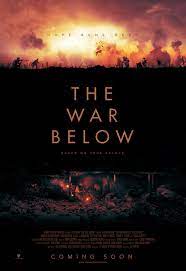
THE WAR BELOW
UK, 2021, 96 minutes, Colour.
Sam Hazeldine, Tom Goodman-Hall, Kris Hitchen, Elliot James Langridge, Sam Clem,ett, Joseph Steyne, Anna Maguire, Andrew Scarborough, Douglas Reith.
Directed by J.P.Watts.
The War Below is a piece of history of World War I trench warfare. It focuses on a group of industrial tunnel diggers who are seconded to the war effort, going to the Somme, going to Flanders, digging under no man’s land, planting explosives to destroy German gun strongholds. (A parallel story about Australian tunnel diggers can be seen in Beneath Hill 60).
The film initially recreates the atmosphere of recruitment for the war, British patriotism, the men lined up to enlist. It also shows those who rejected on health grounds. Included in these is William Hawkin, an expert digger for local industry.
However, there are sequences with General Haig, the desperation at the conduct of the war in 1916, the battle of the Somme, the number of casualties. One of his colonels, nicknamed Hellfire Jack, suggests the digging of tunnels under no man’s land, the idea rejected by Haig who is old school in his conduct of warfare, rejected by Colonel Fielding, superior, looking down on the working classes. However, the decision is made and Jack goes to the factory where William Hawkin works, discusses the matter, initial scepticism, but a group of five going to France. They discover the hardships of dirt and filth in the trenches, are looked down on by the regular soldiers, insulted by Fielding.
The film shows the camaraderie between the diggers, the details of the first tunnel, the explosion and success of the mission. The film also shows the discussion between the men about returning home, continue with their work, the military authorities keen that they dig another tunnel in Flanders. William Hawkin is pigheaded and obsessive, tensions within the group. Fielding charges Hawkin and his associate, Harry, with insubordination and they spend the night as a penalty their hands strung up, reminding audiences of the harsh attitudes of the authorities towards the soldiers during the war.
The next mission is fraught with danger, the Germans now digging tunnels, fights and interactions with the Germans, time and deadlines, a dramatic conclusion.
The film is a tribute to the ordinary citizens who contributed to the war effort.
- The title? World War I? The trenches, the tunnels, the theme?
- Period and atmosphere, costumes, uniform, decor? Military? War action? England, industry and factories? The musical score?
- Audience response to war in the trenches, in France and Flanders, the Somme, Messine, the number of the dead, deaths in no man’s land, the condition of the trenches, dirt, sewage, rats…?
- General Haig? His stances, superior, old style war? Colonel Fielding and his superiority, class stances? Hellfire Jack, his reputation, the desperate situation in the trenches, his idea of the tunnels? Haig negative? Fielding superior? Jack making his case, the agreement?
- The opening, the recruiting, men eager to do their bit for the cause? The father and son? The later glimpse of the son in the trenches delivering the message? William Hawkin, eagerness, discussions, failing the medical?
- Hawkin, industry, tunnel digging, his crew, Jack visiting, the proposal, their not thinking it feasible? The patriotic appeal? Hawkin, his son and wife, her fears, his talking with the boy, the toy soldier – and its return to the boy at the end?
- The men going, military, looked down on, Fielding and his scoffing and insults, Jack and his support? The planning, the maps, the equipment, the filthy conditions in the trenches? The personalities and the team, Hawkin and his stubbornness, leadership, Harry and Shorty, their roles, Charlie and George as young, inexperienced? Life together, the relationships, support, working together?
- The progress of the tunnel, the detail, the hard work, the explosion and its success? Jack and his response? Fielding and his continued superiority?
- The issue of whether to continue, wanting to go back home, Jack and the cricket scene of the hill? Charlie, his girlfriend? William writing letters to his wife?
- The new tunnel, difficulties, the surveying, the soldier caught in no man’s land, William going out, carrying the man back, his justification, authorities and their reaction?
- The project, continue digging, being careful, listening, the Germans and their tunnels? Explosions? Charlie, falling on George, leaving, going out into no man’s land, his being shot? Leaving the letter?
- The decision to continue, Fielding and the insubordination, William and Harry, strung up overnight, the soldier giving the cigarette to William?
- The dangers, the decision, the number of dead anticipated, George falling into the German tunnel, the Germans in the British tunnel, the fight? George discovered in the tunnel, his fight with the German? Psychological repercussions?
- The setup, the timing, the two getting out to set the detonation, William remaining, sending George out, giving him the toy soldier? The German attack, William being wounded? The explosion? The visuals of the explosion, the biggest up till then in war?
- Jack, visiting William’s wife, the son, the medals, the soldier?
- A glimpse of the First World War, trench warfare, tunnels, war in close-up, the number of dead?
Beautiful Creatures/ 2013
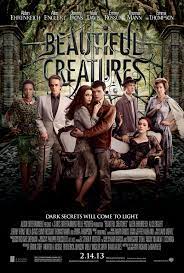
BEAUTIFUL CREATURES
US, 2013, 124 minutes, Colour.
Alden Ehreneich, Alice Englert, Jeremy Irons, Emma Thompson, Viola Davis,Eileen Atkins, Emmy Rossum.
Directed by Richard La Gravenese.
More young love and anguish in the midst of mysteries beyond this world. The post-Twilight era is upon us. This film is based on the first of four novels, Beautiful Creatures, Darkness, Chaos, Redemption, by Kami Garcia, which have proven popular.
In many ways, it is a load of old cobblers – or a load of new cobblers.
We suspend disbelief to accept that there is a mysterious family from the Carolinas, some of whom are powerful Casters (a dignified word for ‘witch’). The girls have the choice at age sixteen to accept their nature (good or evil) and find their place for life as Casters. Lena (Alice Englert – who is the daughter of Jane Campion) turns up in town, goes to school, is responsible for some eerie events (glass blowing out of the classroom windows). She is being protected by her uncle, Macon Ravenswood (Jeremy Irons sporting a Southern accent), so that her choice will be for the good rather than the evil planned by her madly vindictive mother, Saraphine (Emma Thompson). There is also an evil cousin, Ridley (Emmy Rossum). When they all assemble for dinner, it is not a genteel affair!
The other focus of the film is a young lad, brought up by his grandmother, Ethan (a very cheerful, often grinning, Alden Ehrenreich). Needless to say, he is smitten by Lena and does his best to help her, but he is no match for the dark arts. (He is abducted and is mute and bound at that mad meal.)
So, a mixture of Carolina normality with the kind of problems we saw in the Twilight series. But Alice Englert is more sympathetic than Kristen Stewart and Alden Ehrenreich more energetic than Robert Pattinson. And the supporting cast is much more interesting, especially Emma Thompson, with Saraphine taking the form of a local fire-and-brimstone Christian lady. Her first scene where she appears, denouncing the condemned in Church and her transformation to her real self is a high point of the film. But, so are her other appearances. She proves that a performance that is over the top can be hugely entertaining.
Box office returns will determine whether we move on to the next episodes in the novels.
- The title? Expectations?
- Fantasy, Gothic touches, romance? In the US context?
- South Carolina, the town, school, students, gossip? Accusations of devil worship? Homes, the musical score?
- Ethan’s story, wanting to get out of the town, his age, school, family, gossip, the encounters with Catalina, the car accident?
- Lena, in class, breaking the windows, fearing she was a witch? A locket? The apparitions of the Civil War, her 16th birthday approaching? Her mother, embodied in Mrs Lincoln? Her mother wanting Lena to oust the humans from earth, leaving only their own kind?
- Make on, his reputation, devil worshipping? The bond with Amma? The Casters and their skills?
- Ridley, in the town, Serafina and Lena? Mrs Lincoln? The relationship with A link?
- The Civil War, the visions? Casters? Genevieve and Ethan in the 19th century? Ethan’s death, revived? Genevieve and her cursing the family?
- And, as a seer, her work in the library, knowledge of the books, which could undo the curse? Contact with Ethan?
- The re-enactment of the Civil War? Ridley and Link? The bullet? Lena and the Tornado? Ethan, revived? The execution re-enactment? Make on and his disguise?
- The complexity of the interactions, deaths, survival, revival, the bodies, Serafina imprisoned, being freed?
- Six months later, Am and Link? Seeing the burnt sign for the town? Ethan and Lena and the resolution?
BAC Nord: Stronghold
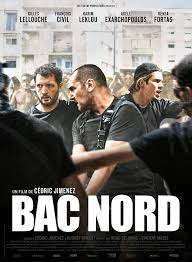
BAC NORD/THE STRONGHOLD
France, 2020, 93 minutes, Colour.
Gilles Lellouche, François Civil, Karim Leklou, Adele Exarchopoloous, Kenza Fortas.
Directed by Cedric Jimenez.
There has been a strong tradition of French police films, Policiers, from the 1930s but, especially during the 1970s (often with a land along) and this has continued on television and on the cinema screen. Many of them were located in Marseilles.
This is a Marseilles story, especially the northern district of the city, an area with a strong reputation for crime, for drug dealing. A particular area is nominated as The Ghetto, tough guards, multi-racial, checking who was coming in and going out.
This film is based on a true story, on the demands by police authorities for offices to measure up to a quota of drug busts and arrests, taking in drugs. However, a number of the police used some of the drugs taken as a way of payment to informants. In 2012, a number were arrested and charged with criminal offences, shaking up administration with political repercussions. In this film, the focus is on three of these offices.
There are three strong and very different performances, especially from veteran Gilles Lellouche, 20 years on the force, extraordinarily tough, a loner in his own life, but, surprisingly, prone to mental collapse after his arrest. François Civil is the young policeman, rather happy-go-lucky in his attitude towards his work, to his friends. And it is he who has the young addict is his informant and pays her off in drugs. Karim Leklou is the married officer, his police officer wife expecting a child.
The three are seen in action, confronting the toughs in the Ghetto, deciding not to give themselves away in going to the rescue of a parallel squad. However, under the supervision of their deskbound commander, a huge operation is planned and carried out in the Ghetto. This action is expertly choreographed and edited, tracking suspects, changing trackers, finding the main stash, the confrontation, shootouts.
This might have been enough for such a film but in the second part, the tone changes considerably as the three men are arrested (although there has been an indication of this at the very opening of the film, treated very harshly, severely interrogated, secluded, limited phone calls… The pressure is on the young policeman to give up the name of his informant. Given the pressures on his other two, he does give up the name and the men are released.
So, two films in one, a police action thriller and a psychological drama of the internment of the officers.
- The tradition of French tough police films? Marseilles settings? Based on a true story? Fictionalised? From 2012? And subsequent scandal?
- The city of Marseilles, the North district, streets, buildings, the ghetto area, apartments, drug dealing? Police precincts? The musical score?
- Law enforcement? The reputation of Marseilles Nord? Targeting one drugs and the dealers? Targets for the week for achievement? Reputations? The need for informants? The decision to give drugs as payment for information? Legal/illegal situation?
- The focus on the three policeman, their friendship? Working together? The challenge for quotas? The relationship with their supervisor, his sitting behind the desk? And not backing them up?
- The details of their activity, undercover, infiltrating, observing? Greg as their leader, age, experience, 20 years, tough exterior, the loner? Confrontations, fights? Vass, the married man, also tough, dealings, confrontations? His wife, pregnancy, giving birth? His delight in his child? Antoine, loner, the contact with his informant, her age and experience, information, paying her? The attraction? It letting her go? His own use of drugs?
- Ventures into the ghetto, the confront stations and stances, the types on the ghetto, the racial mix, big and tough, the deals, the stashes, the money? The other team? Calling for help, Greg deciding not to go, the later confrontation and an explanation?
- The three, having to back down, staying within the law? But getting the information from the informant? The big deal?
- The screenplay and its attention to the detail of the action? Hand-held camera? Documentary-like? The details of the strategy, the three and their tasks, the backup? The members of the ghetto, suspicions, stances? Lookouts, following suspects, capias going into the building, the dangers, going up the steps, identifying the room, hiding with the woman and her son, the son stabbing Yes? The others coming, the fight, the shooting, getting into the stash room, fights, escapes, the drugs, the money? Getting to the car, yes and his wound, the crowds surrounding the car, crashing through the barrier?
- The acclaim for the achievement? The other squads? Deliberations?
- The opening of the film with Greg interrogated, fingerprints, imprisonment? Audiences waiting over an hour to find the reasons? The shock of the three men being arrested, their homes searched, presuppositions against them?
- Yvon the interrogator, with each, relentless? Greg and the superior interview together, the Superior denying all knowledge?
- Each of the men in prison, Greg, angry, violent, medication, appealing to the guards, mental collapse? Injuring his hands? The sadness for yes, isolated, waiting a month for the phone call, the visit from his wife, her police background, her support? Antoine, adapting, arranging things very neatly uncomfortably in his cell? Exercise in keeping fit? More cheerful disposition? The reaction to the guards?
- Vass, asking for a haircut, required to be done by prisoner, and one coming in, prisoners not talking to one another, yes talking to the guard and explaining Greg’s breakdown?
- Antoine, fidelity to the informant, refusal to give the information, the situation for Greg and yes, his moral dilemma, giving up the informant, seeing her in the waiting room?
- The men going free, each one resume his life? The final information about the consequences of the case? And each one taking up a new job?
Killer under the Bed
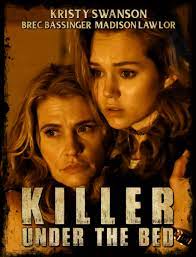
KILLER UNDER THE BED
US, 2018, 90 minutes, Colour.
Kristy Swanson, Brec Basinger, Madison Lawlor, Chris Prascus, Ashlee Fuss, Kristin Carey, Frederick Dawson.
Directed by Jeff Hare.
There has been a tradition of films about murderous dolls. That is the classic British 1940s Dead of Night. In the 1970s there was Anthony Hopkins in Magic. However, in the 1980s, one of the most murderous of dolls, Chucky, took the limelight and has appeared in quite a number of sequels. In a way, the murderous doll in this film, The Voodoo Baby, is a Chucky story for the mid-teens audience, especially for girls who are at the centre of the plot. Adult audiences will probably find it rather trite, not well acted, highly contrived.
Kristy Swanson, not one of her best performances, loses her husband in an accident, has to move house with her two teenage daughters, resuming her career as a dentist. The older daughter, Chrissy, is athletic and dominant. The younger daughter, Kilee, resents the move as distancing the memory of her father.
The usual aspects of the new school, the mother in her new job, a surprising character, Tina, who is the local bully, with a disciple in tow, who demands $100 protection or Kilee’s jacket. In the meantime, one of the dentists resents the mother’s arrival. Then there is the history teacher in Kilee’s class who has an eye on the student – something of an indication of predator.
The film opens with a young woman frightened, going into a shed, terrified and later taken to an asylum. However, when Kylie goes into the shed, she discovers The Baby Voodoo hanging, a nurse around its neck. She seeks information online and finds details about curses. The rest of the film, she pins pieces of clothing, notes on the doll in crucial places, Chrissy getting pains in her leg, bully Tina becoming lips disfigured, the English the history teacher really turning into a predator, the rival doctor at the dentistry becoming surprisingly agreeable then hyper- aggressive. Of course, Kylie wants to reverse some of her decisions, seeing the dangers.
She goes to the asylum, is advised by the traumatised woman that the doll has to be killed, by hanging. Kylie tries to bury the doll which takes on a life of its own, extremely mobile. Clearly, this is leading to a confrontation in the house, the teacher present, the two sisters fighting, Chrissy possessed by the doll, the mother taking matters into our own hand and she and Kylie hanging the doll.
Very much for the mid-adolescent audience.
